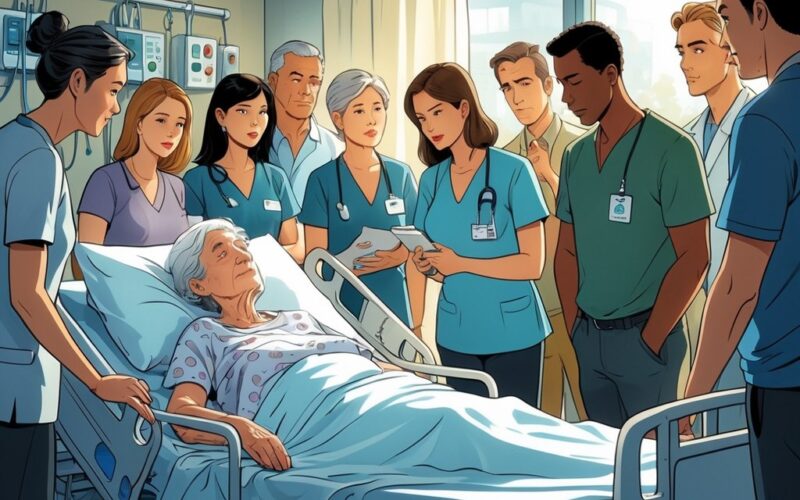A medical power of attorney lets you pick someone to make healthcare decisions when you can’t speak for yourself. Lots of folks put off creating this document, maybe not realizing what could happen if they need care but can’t explain their wishes.
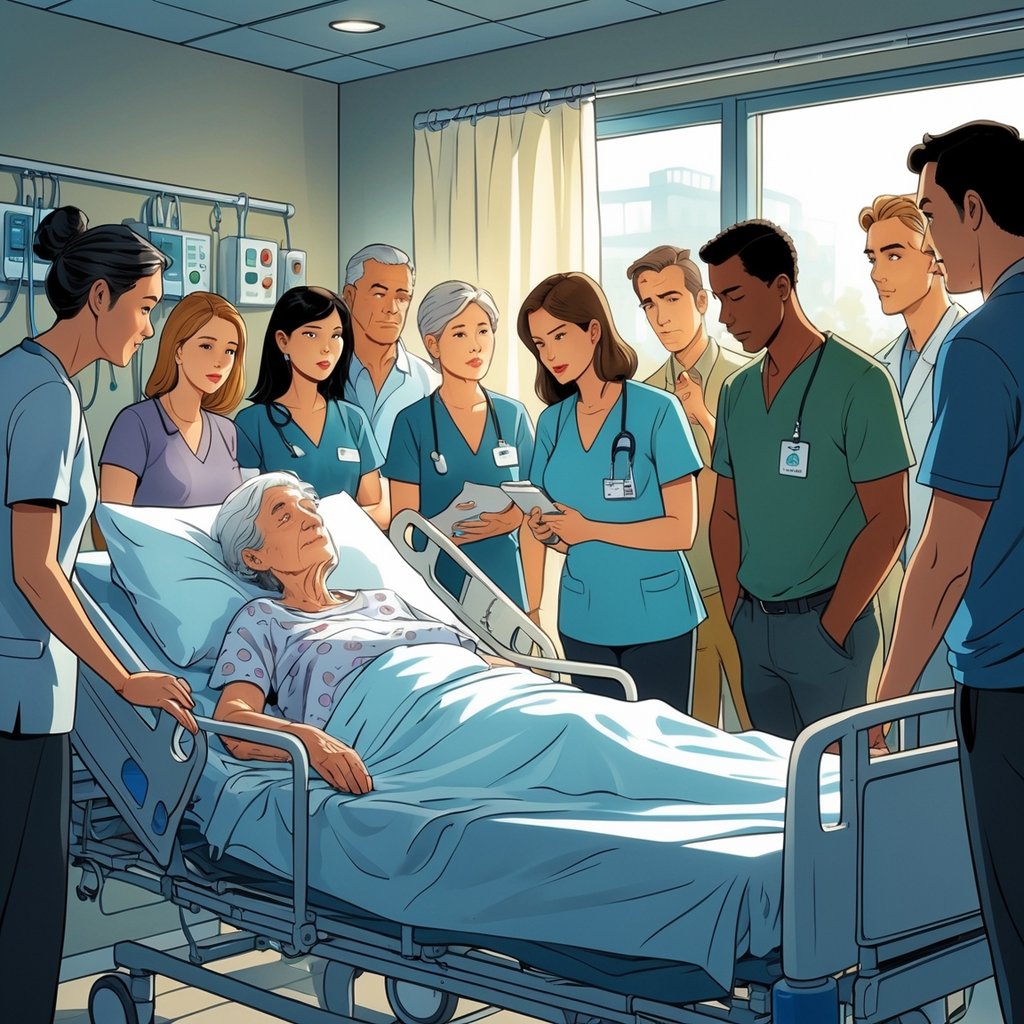
If you don’t have a medical power of attorney, state laws decide who makes your medical decisions, following a set order: spouse, adult children, parents, siblings. This can cause real trouble if your family disagrees about your care or if nobody’s around to make decisions fast.
Medical decisions get tricky if you haven’t legally picked someone to speak for you. Hospitals might keep you on life support while your family argues in court. Doctors can’t share important medical info with people who want to help but don’t have legal authority.
Key Takeaways
- State law picks your medical decision-maker if you don’t have a medical power of attorney, and their choice might not match yours.
- Family fights can delay care and force expensive court battles.
- Making a medical power of attorney and advance directive keeps things clear and helps make sure your wishes are followed.
What Is a Medical Power of Attorney and When Is It Needed?

A medical power of attorney is a legal paper that lets you pick someone to make healthcare decisions if you can’t. It kicks in when you’re incapacitated and covers everything from routine treatments to end-of-life care.
Definition and Purpose
A medical power of attorney gives a person you choose the authority to make healthcare choices for you if you’re incapacitated. That person is called your agent or proxy.
Your agent steps in when doctors decide you can’t make your own medical choices. Maybe you’re unconscious, confused, or unable to understand treatment options.
The document gives your agent specific powers. These include:
- Surgical procedures and treatments
- Medication choices and dosages
- Life-sustaining interventions like breathing support
- End-of-life care decisions
Your agent should follow your known wishes and values. They can’t just choose what they’d want for themselves.
Situations Triggering Its Use
Your medical power of attorney comes into play when you can’t communicate your healthcare wishes. This happens if you’re in a coma, have severe dementia, or are under anesthesia for surgery.
Mental health crises can also trigger it. If you have an episode that clouds your thinking, your agent may need to step in.
About 75 percent of Americans will end up in a situation where they can’t make medical decisions. This isn’t just about old age—it can happen after an accident, sudden illness, or with progressive diseases.
Emergencies often need fast decisions. Having a power of attorney for health care means your chosen person can act right away.
Difference Between Medical and Durable Power of Attorney
A medical power of attorney only covers healthcare decisions when you’re incapacitated. A durable power of attorney deals with money and legal stuff, like paying bills or signing contracts.
You really need both for full coverage. Your medical agent could be different from your financial agent, depending on who you trust for what.
Both documents stay valid if you’re incapacitated. They serve different purposes and can’t substitute for each other.
Who Makes Medical Decisions If You Don’t Have a Medical Power of Attorney?
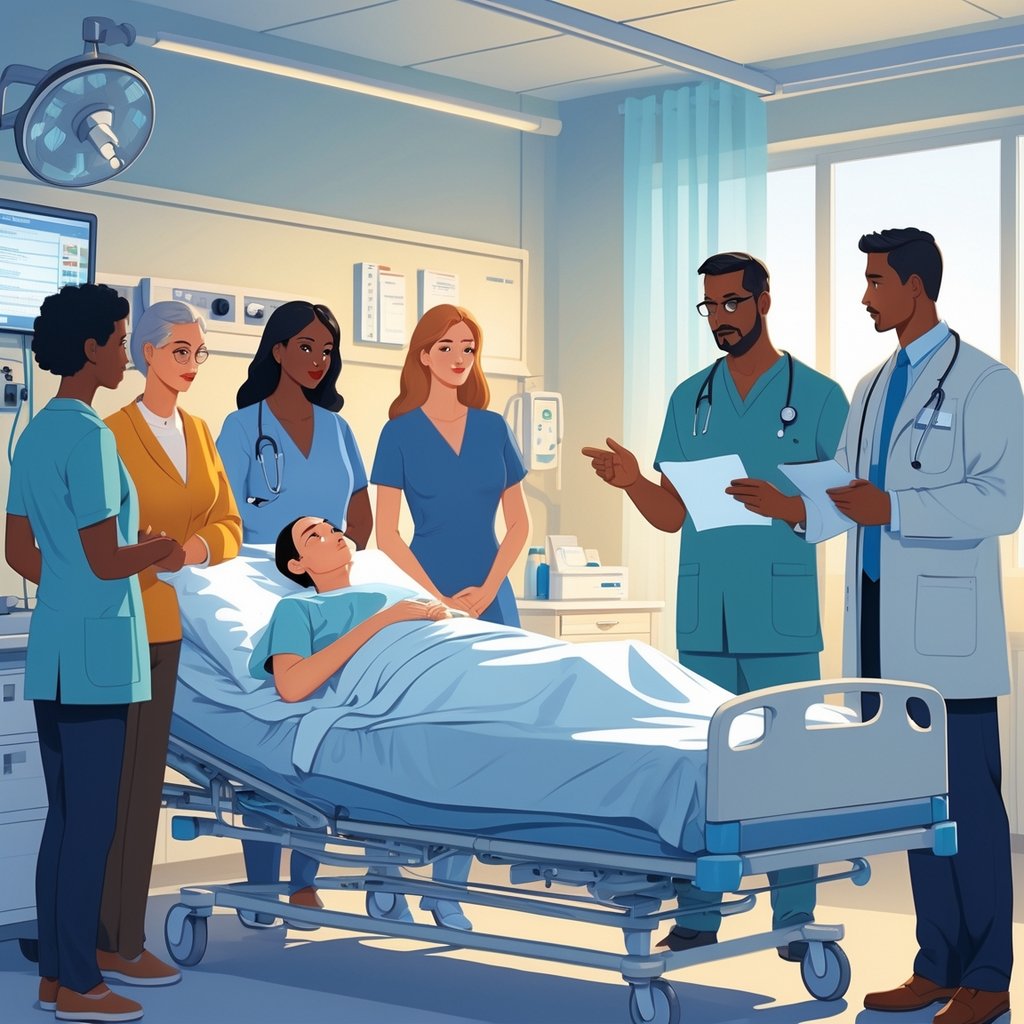
If you don’t have a medical power of attorney, state laws decide who gets to make healthcare decisions through a set order of family members. If there’s no family, healthcare providers and courts step in.
Statutory Order of Decision Makers
State law lines up a list of people who can make medical decisions for you. This order exists to make sure someone can always give consent.
Common Priority Order:
- Spouse – Your legally married partner
- Adult children – Kids over 18
- Parents
- Adult siblings
The first available person in this order becomes your decision maker. They’re supposed to act in your best interest.
Some states add other relatives or a close friend if the main list runs out. Texas law is similar but details can vary.
This person can make all kinds of healthcare decisions, from routine stuff to big calls about life-sustaining treatment.
Role of Healthcare Providers
Healthcare providers follow strict rules when you can’t decide for yourself. They look for the highest-priority person on the list.
Provider responsibilities:
- Find the right decision maker
- Check their legal authority
- Share needed medical info
- Follow the surrogate’s decisions
In emergencies, providers can act right away to save your life. After the emergency, they have to find a proper decision maker before moving forward.
When family members fight about your care, providers are stuck in the middle. They usually keep up current treatment while trying to solve the dispute.
Some hospitals use ethics committees to help families sort things out. These groups include doctors, social workers, and sometimes community folks.
What Happens in the Absence of Family
If no family members are around or willing to make decisions, things get messier. Courts have to step in.
Court-Appointed Guardianship Process:
- Someone files a petition with the court
- A judge reviews proof that you can’t make decisions
- Family members might testify
- The court appoints a guardian
This court process can drag on for weeks or months and costs money. Everything becomes public record, which some families hate.
The judge picks the best person to serve as guardian. It could be a family member, a friend, or even a professional guardian.
Until a guardian gets appointed, healthcare providers might need to make emergency decisions. They focus on keeping you alive and stable while the legal stuff plays out.
Risks and Consequences of Not Having a Medical Power of Attorney
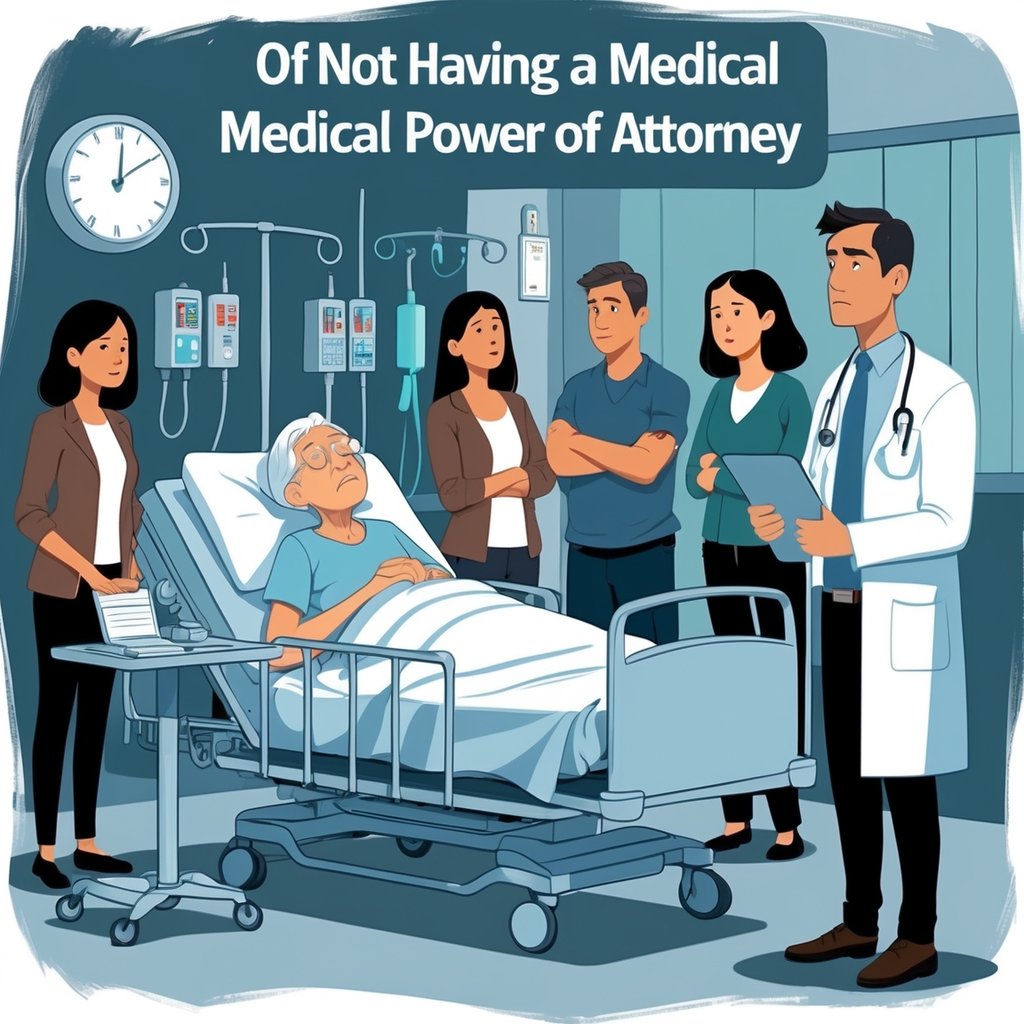
If you’re incapacitated and don’t have a medical power of attorney, you lose the right to pick who makes your health care decisions. This can lead to family fights and delays in getting the care you need.
Loss of Control Over Healthcare Choices
No medical power of attorney means you can’t choose your health care decision-maker. State law steps in instead.
The law follows this order:
- Spouse
- Adult children
- Parents
- Adult siblings
This default system might not pick the person you’d want. The law could pick someone who barely knows your wishes.
Your family member has to guess what you’d want. They might make choices that clash with your values.
The person chosen by law can:
- Say yes or no to treatments
- Approve or refuse surgery
- Decide on end-of-life care
- Pick doctors and hospitals
Potential for Family Conflict
Family fights pop up when multiple people at the same level can’t agree on treatment. Adult children might have totally different ideas about your care.
One child could want every possible treatment. Another might think comfort care is more humane.
If families can’t agree, hospitals keep you on life support until someone sorts it out. This piles on stress during a tough time.
Hospitals may bring in an ethics committee to help. If that fails, the fight can end up in court.
Common family disagreements:
- Using feeding tubes
- Aggressive treatment versus comfort care
- When to stop life support
- Picking hospitals
Delay in Critical Medical Care
Emergencies need fast decisions. If you’re incapacitated and lack a medical power of attorney, doctors have to track down your family first.
This can eat up precious time. Doctors might need to locate relatives and get them to the hospital before acting.
If the family argues, delays stretch even longer. The court process for appointing a guardian can take ages.
During these delays, your condition could get worse. You might miss the best shot for certain treatments.
Decisions that might get delayed:
- Emergency surgery approval
- Starting or stopping meds
- Moving to specialized care
- Beginning rehab
Legal Processes When No Medical Power of Attorney Exists

If you’re incapacitated and have no medical power of attorney, the court appoints a guardian to make healthcare decisions for you. This legal process involves court hearings, costs money, and can cause delays that affect your care.
Court-Appointed Guardian or Conservator
A court-appointed guardian gets legal authority to make medical decisions for you. The court picks this person based on state law and what seems best for you.
Guardians have to:
- Make healthcare decisions for you
- Talk with doctors and staff
- Consent to or refuse treatments
- Access your medical records
The guardian must follow court orders and might need to report back to the judge. They can’t go against your known wishes if you shared them before.
A conservator deals with money, not medical stuff. Some states use different words, but generally, the guardian handles healthcare and the conservator handles finances.
Guardianship and Conservatorship Process
The guardianship process takes several legal steps and can drag on. Someone files a petition with the court asking to be your guardian.
The process usually goes like this:
- Filing the petition – A family member or someone else submits paperwork to the court
- Medical evaluation – A doctor confirms you can’t make decisions
- Court hearing – A judge reviews the case and hears from interested people
- Guardian appointment – The court names someone to decide for you
You have a right to a lawyer during this process. The court can appoint one if you can’t afford it.
State laws decide who can be your guardian. Usually, it’s your spouse first, then adult children, then parents or siblings.
Costs and Delays Associated with Court Proceedings
Guardianship proceedings rack up costs your family has to cover. You might see expenses in the thousands before anything wraps up.
Common costs include:
- Court filing fees ($200 to $500)
- Attorney fees ($2,000 to $5,000 or more)
- Medical evaluations ($500 to $1,500)
- Guardian bond insurance (varies depending on state)
The process drags on for 30 to 90 days. During this period, medical decisions can stall while the court figures out who gets to act for you.
Potential delays pop up when:
- Family members can’t agree on a guardian
- You fight the guardianship petition
- The court calendar is packed
- Paperwork is missing or incomplete
These delays mess with your medical care when time matters. Medical professionals may be unable to share information with your family until the court appoints a guardian.
Implications for Financial and Other Non-Medical Matters

Without a medical power of attorney, your loved ones hit roadblocks getting into your financial accounts or managing your property. This gets stressful fast if you need someone to pay bills or handle financial obligations during a health crisis.
Access to Financial Accounts
Banks and financial institutions refuse to let family members touch your accounts unless they see legal authority. Even your spouse can get turned away from individual accounts.
Your family ends up in court trying to get permission to manage your money. That takes weeks or months and comes with hefty legal fees.
Joint accounts help a bit since both owners can access funds. Still, individual accounts, investments, and retirement funds stay locked tight.
Credit card companies freeze your accounts if they learn you’re unable to make decisions. No one can use your cards to pay for medical care or daily needs.
A durable power of attorney for finances can fix all this by giving someone clear legal authority.
Managing Property and Bills
Your mortgage, utilities, and insurance bills don’t stop just because you’re out of commission. Family members can’t legally pay these without court approval.
Property maintenance gets tricky too. If nobody has legal authority, repairs and hiring contractors are off the table. Your home could fall apart before you’re back on your feet.
The court process for financial guardianship looks like this:
- Filing paperwork
- Showing up at hearings
- Paying attorney and court fees
- Waiting 30 to 90 days for a decision
Your family has to convince a judge you can’t manage your own affairs. They also need to prove they can handle your financial management needs.
Business owners face even more headaches. Partners can’t get into business accounts or sign contracts for you without legal documents.
Steps to Protect Yourself and Your Loved Ones

Creating a medical power of attorney means picking the right person and following the right legal steps. It’s smart to get professional advice so your documents actually work for your family and your state.
How to Appoint a Medical Power of Attorney
Pick someone you trust to make medical decisions for you. They need to get your values and stand up for what you want.
Your agent should live close enough to handle emergencies. They’ve got to keep calm under stress and talk openly with doctors and your family.
Key qualities to look for:
- Solid decision-making skills
- Familiarity with your medical preferences
- Ability to handle conflict without drama
- Available when things get tough
Fill out the medical power of attorney forms your state requires. Most places have specific forms needing signatures and witnesses.
Name a backup agent just in case. Talk with both people about your wishes so there’s no confusion.
Keep copies of your documents somewhere easy to find. Give them to your doctor, hospital, and your chosen agents.
Seeking Legal Advice
An attorney will help you make documents that work in your state. Each place has its own rules for these forms.
Benefits of legal advice:
- Makes sure everything’s done right
- Handles complicated medical situations
- Coordinates with your other estate documents
- Updates your documents when laws change
Elder law attorneys know the common issues families face. They can explain how your medical power of attorney fits with living wills and other directives.
Legal advice is crucial if you have tricky medical conditions or complicated family stuff. An attorney helps you plan for the curveballs life throws at you.
Check your documents every few years or after big life changes. Marriage, divorce, or moving to a new state may mean you need updates.
Special Considerations for Complex Family Dynamics
Family drama can make medical decisions a nightmare if you don’t have clear legal authority. A medical power of attorney keeps disputes between family members in check.
If your immediate family can’t get along, maybe pick a neutral person everyone trusts. Sometimes that’s the only way forward.
Tricky situations needing extra planning:
- Divorced parents with adult kids
- Blended families with stepchildren
- Estranged relatives
- Religious disagreements about care
Talk honestly with your family about your choice. Let them know why you picked your agent and what you want.
If your family can’t agree on treatments, write your wishes down clearly. Spell out your instructions for life support, pain management, and end-of-life care.
You might think about naming co-agents who both have to sign off on big decisions. But honestly, that can slow things down when time is short.
Frequently Asked Questions
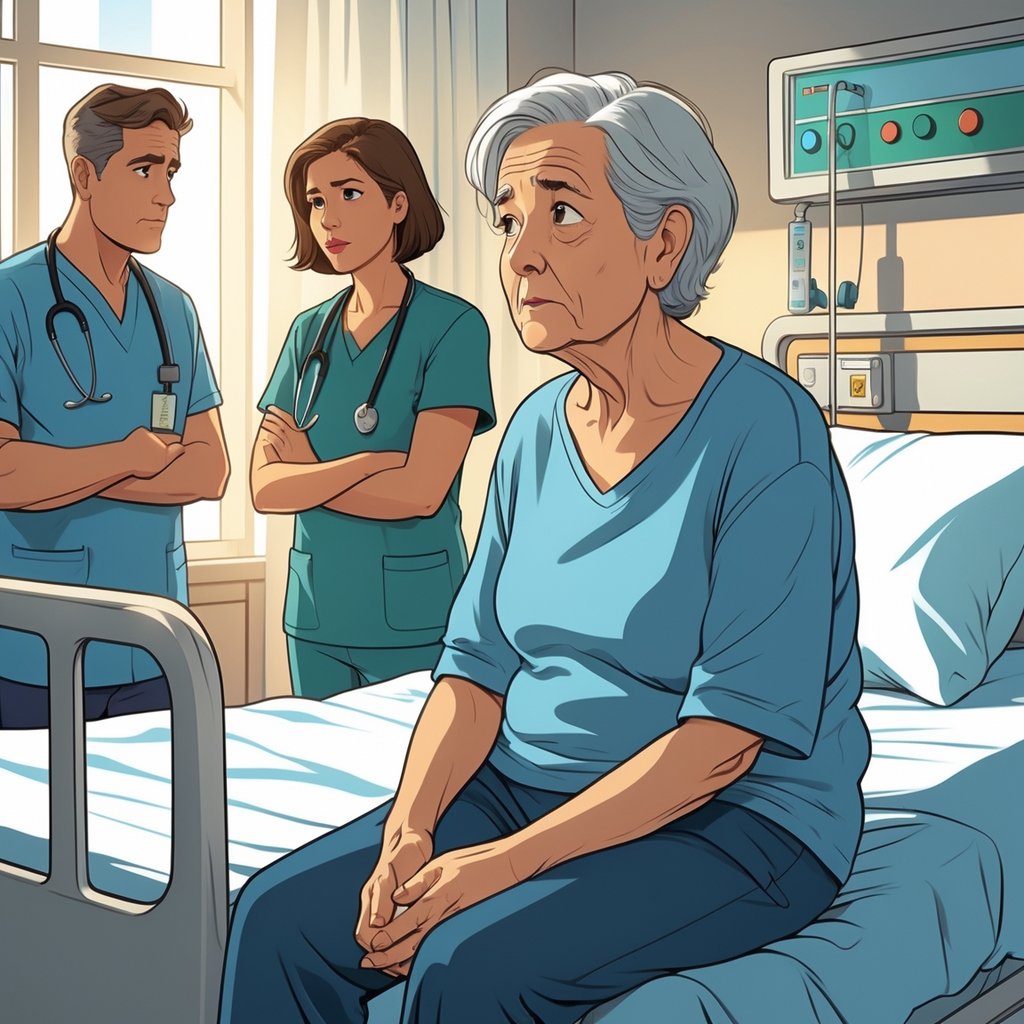
If you don’t have a medical power of attorney, certain people get the right to make healthcare decisions for you. Courts might have to step in, and healthcare providers face legal challenges without a clear decision-maker.
Who is authorized to make medical decisions on behalf of an incapacitated individual without a designated medical power of attorney?
Your next of kin usually gets to make medical decisions if you don’t have a power of attorney. The order goes spouse, adult children, parents, then siblings.
State law decides what happens if you’re incapacitated without a medical power of attorney. Some states let healthcare providers rely on your next of kin.
The exact order changes from state to state. Your spouse is usually first, then your adult kids as a group.
If there’s disagreement among family, things get messy. Healthcare providers might need the court to sort it out.
What is the standard procedure for determining a healthcare surrogate in the absence of a medical power of attorney?
Healthcare facilities go with state surrogate laws if you can’t decide for yourself. These laws create a priority list of who can step in.
Staff will look for your closest available relative. They’ll check the relationship and make sure the person is willing to take on the job.
Some places require several family members to agree on big decisions. Others let one person from the top of the list decide solo.
Documentation rules differ. Your surrogate might have to sign forms accepting the responsibility.
How are medical choices determined for an individual who cannot make decisions and has no medical power of attorney or next of kin?
Courts appoint a guardian if you don’t have family available. This takes time and involves legal steps to set up guardianship.
Without a POA, nobody can automatically manage medical decisions until the court gives the green light. The court picks someone to make choices for you.
Healthcare providers sometimes need emergency court orders for urgent care. That can stall important treatments.
Some states have public guardian programs for people without family. These programs assign professionals to make your medical decisions.
What are the legal implications for healthcare providers when there is no medical power of attorney for a patient?
Healthcare providers face higher liability risks when treating patients without clear decision-makers. They have to document their efforts to find authorized people.
Providers might need to pause non-emergency treatments until they get proper authorization. This shields them from lawsuits over unauthorized care.
In emergencies, providers give life-saving treatment without consent. For ongoing care, they still need family or court approval.
Some hospitals require ethics committee reviews for tough cases. These committees help when there’s no clear surrogate.
In the event of an individual’s death without a medical power of attorney, who is responsible for making end-of-life decisions?
Your next of kin makes end-of-life calls if you can’t. The same order applies: spouse, adult children, parents, then siblings.
End-of-life choices include life support, comfort care, and organ donation. Family members can’t make healthcare decisions without legal authority.
If family members argue about end-of-life care, courts might step in. That adds stress at an already hard time.
Some states have rules about stopping life support. They might require several family members to agree or a court’s approval.
Can a court-appointed guardian make medical decisions for someone who lacks a medical power of attorney?
Yes, court-appointed guardians can make medical decisions for you. The court gives them this authority through a formal guardianship process.
Guardians must consider your best interests when making healthcare choices. They basically hold the same power as someone you’d have picked yourself, which can feel a bit unsettling if you think about it.
The guardianship process involves court hearings and proof of incapacity. This route can take a while and usually comes with extra costs that a power of attorney could have avoided.
Someone you would not have chosen may end up making medical decisions for you when courts appoint guardians. The court picks based on legal standards, not what you might have wanted.






